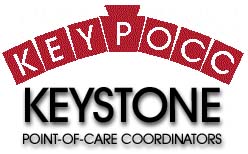|
|
|
Follow the Coagulation Cascade to Chocolate Town USA POC Meeting March 10, 2009 Agenda I RSVP I Directions I Speakers Penn State Milton S. Hershey Medical Center 500 University Drive, Hershey, PA 17033 • 717-531-0003 ext#283256
Hosts: Carrie Bell & Tom Stipe
We thank Roche and Abbott Point of Care for Providing Educational Support & Our PACE Credit sponsor Nova Biomedical Corporation
Continental Breakfast & Sign-in 9:00am Welcome & Announcements 9:10am “Heparin Monitoring” 10:15am Break 10:30am “Overview of a Pharmacist-based Anticoagulation Clinic”
11:45am Lunch
1:00pm “Patient Safety”
2:00pm Business Meeting
RSVP by February 27th
Reply by Email: nberkheiser@gshleb.org OR by Fax at: 717-228-2986 (Attn: Noreen Berkheiser). For more information contact: Noreen Berkheiser @ 717-228-2945 x203. There is a $10.00 meeting registration fee for all non-KEYPOCC members. Directions & Registration
Directions to Conference Center (once you are on campus) Enter the main entrance of the medical center at the intersection of Route 322 and University Drive. At the first stop sign, turn right onto Campus Drive. Follow Campus Drive until you see the sign on your right for the University Fitness and Conference Center. Turn right and look for signs for Fitness and Conference Center parking.
Parking is in the University Fitness and Conference Center parking lot to the front and to the left of the facility. There are signs posted that the lot is for University Fitness and Conference Center only.
Thomas Nifong MD, Associate Professor of Pathology at the Penn State Hershey Medical Center. His clinical roles include Medical Director of the Hematology and Thrombosis Laboratory and Staff Physician in Clinical Pathology and Apheresis. Today Dr. Nifong will focus on Heparin Monitoring. Normal hemostasis is controlled by a balanced interaction between vascular, platelet, and coagulation systems. When this balance is perturbed it can result in thrombosis or bleeding. Heparin is often used as an anticoagulant to prevent thrombosis in patients undergoing surgical procedures. This presentation will emphasize heparin use and monitoring to decrease complications of both thrombosis and bleeding.
Beth Bittner, B.S. Pharm, RPh, Frank Herrmann, B.S. Pharm,RPh and Paul Kocis, B.S. Pharm, Pharm.D., RPh are all staff members of the Penn State Hershey Medical Center Anticoagulation Clinic.
Karen Runkel is a Certified Professional Coder with the Department of Pharmacy. Participants will gain an understanding of the benefits of a pharmacist-based anticoagulation clinic versus routine medical care with a dramatic presentation. Participants will also gain understanding of the value of point-of-care anticoagulation monitoring. A review of the history of the Penn State Hershey Medical Center Anticoagulation Clinic with its challenges and successes will be undertaken. Participants will also gain an understanding of basic coding and reimbursement guide lines as they pertain to Medicare and Third Party payers.
Debra Barnette Pharm.D. is from Wake Forest University Baptist Medical Center, Winston-Salem N.C. and is a talented member of Roche’s Speakers Program will present on patient safety with a concentration on the National Patient Safety goals as they relate to anti-coagulation therapy. There have been a lot of changes in the last 12 month regarding anti-coagulation management. The Joint Commission 3E guidelines were given and many institutions are in the process of resolving these issues. Standardization is the key for the future. The goal is to reduce the likelihood of patient harm associated with the use of anti-coagulation therapies.
|
|
Last updated: 09/16/2009 • Questions or corrections: My Point of Care.net |
